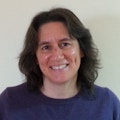Debbie Lindell, Ph.D.
Professor, Department of Biology, Technion-Israel Institute of TechnologyDebbie Lindell’s website
SCOPE-ALOHA Project: The Role of Cyanophages in Ecological Processes in the North Pacific Ocean
Marine phages are important players in regulating microbial population dynamics and community structure, and in the biogeochemical cycling of matter among different functional groups of microbes. However, we have little appreciation for how phages influence particular taxonomic or functional groups of microbes. In addition, we have practically no understanding of the impact of distinct phage families on these microbial processes.
The goal of this project is to gain insight into the impact of different cyanophage types on the cyanobacterial community in the North Pacific Ocean. To this end, we will characterize cyanophage populations at Station ALOHA and assess the degree to which they infect their cyanobacterial hosts. In collaboration with others, we further aim to investigate the impact of virus-mediated cyanobacterial lysis on microbial populations.
The incorporation of these findings into ecosystem level models will improve our understanding of the multi-level influence of phages on microbial processes in the North Pacific Ocean: from direct impacts on the primary producing cyanobacteria to the influence of the movement of photosynthate from cyanobacteria to heterotrophic microbes.
Bio:
Debbie Lindell is professor in the biology department at the Technion – Israel Institute of Technology. She received her B.S., M.S. and Ph.D. from Hebrew University of Jerusalem in Israel and carried out her M.S. and Ph.D. research at the Interuniversity Institute for Marine Sciences (IUI) in Eilat, Israel. During her M.S. research, Lindell assessed phytoplankton population dynamics in the Red Sea and found pronounced seasonal succession between the eukaryotic phytoplankton Synechococcus and Prochlorococcus that was set in motion by deep mixing in winter.
During her postdoctoral work, she studied nitrogen utilization in marine cyanobacteria and developed a gene expression method for assessing the nitrogen status of Synechococcus field populations. She carried out postdoctoral research training at the Massachusetts Institute of Technology, working on the physiological and evolutionary implications of photosynthesis genes in phages that infect Prochlorococcus.
Lindell’s research at the Technion uses a combination of laboratory experimentation and field studies to investigate the ecology, physiology and evolution of host-virus interactions, with the goal of understanding how these interactions impact the ecological roles of both cyanobacteria and cyanophages in ocean ecosystems. Lindell received the Yigal Alon Fellowship from the Israel Council for Higher Education (2007-2010), the Robert J. Shillman Career Advancement Chair from the Technion (2007-2012) and the Krill Prize for scientific excellence from the Wolf Foundation (2009).